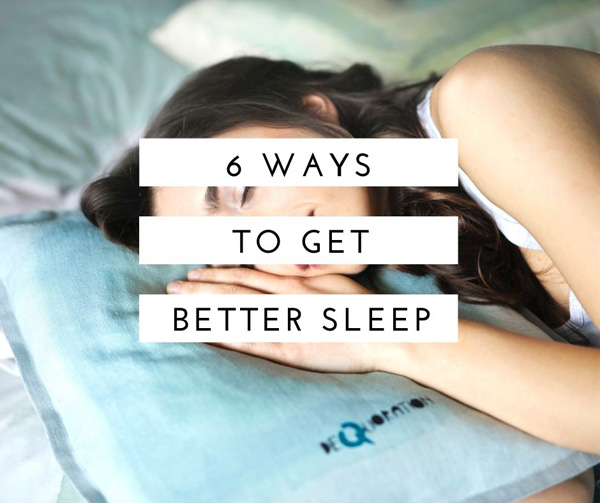If you get seven to eight hours of sleep each night and still wake up exhausted, your sleep quality may be suffering. Whether you realize it or not, you may be waking up multiple times a night, which can disrupt REM sleep. This part of your sleep cycle is essential to helping your body and mind recover so you can wake up feeling refreshed. Subsequently, poor sleep can leave you exhausted and even more tired than the day before.

Luckily, there are a few ways to get better sleep so you aren’t battling chronic fatigue.
1. Maintain a Routine
One of the best ways to improve your quality of sleep is to maintain a consistent routine and sleep schedule. Wake up at the same time each day and create a healthy morning routine that includes movement, caffeine, sunshine and deep breaths.
Then, when evening rolls around, let your body know that it’s time for bed by reading a book, listening to music or dimming the lights. Begin this nightly routine at the same time every day to unwind and prepare your mind and body for rest. The consistently you stick to a schedule, the more easily you’ll fall asleep and wake up.
2. Create a Restful Environment
Creating a restful environment can help you fall asleep quicker, too. Turn your bedroom into a calming oasis by painting the walls a cool, dark color. Use black-out curtains to minimize light exposure and a white noise machine to drown out your noisy neighbors. Remove clutter and organize your closet, under-bed storage and other areas that tend to get messy over time.
You might also invest in some high-quality bedding or a new mattress to support good posture while you sleep.
- Turn the thermostat down a few degrees or crack a window to effectively lower your core body temperature and avoid overheating and sweating. Finally, if you are naturally a hot sleeper, think about switching to a more breathable mattress. Visit Nolah Mattress to learn more about how cooling mattresses work.
3. Minimize Blue Light Exposure
Phones, tablets, television screens and other devices all emit blue light, which can disrupt your circadian rhythm. While light of any kind can suppress melatonin secretion, blue light does so more powerfully, which can make falling asleep more difficult.
Researchers have also linked blue wavelength exposure after sundown to diabetes, obesity, heart disease and even cancer. Thus, it might be best to put your phone down a few hours before bed and eliminate all screens from your bedroom.
4. Use an Oral Appliance
If you wake up multiple times a night or are greeted by a headache every morning, you might suffer from congestion, a deviated septum or sleep apnea. These conditions can limit or completely cut off your oxygen supply while you’re sleeping and make it difficult for your body and mind to recover at night.
Luckily, you can increase your oxygen intake and quality of sleep with an oral appliance. This device moves the jaw and tongue forward to open your airways and allow better airflow. Of course, falling asleep with this appliance in your mouth might take some practice. However, your body will quickly adjust and you’ll be sleeping soundly in no time.
5. Take a Bath
If you need an excuse to buy more bath bombs, this is it. Taking a warm bath or shower an hour or two before going to bed can help you fall asleep and get a better night’s rest. Even just 10 minutes in the bath can decrease the amount of time it takes to fall asleep by nine minutes.
How does this work? Soaking in the tub brings your blood to the surface of your skin and allows heat to radiate out of your hands and feet. While you might feel warm, this process actually releases heat from your body and lowers your core body temperature so you can sleep more soundly.
6. Try Supplements
When bedtime routines and peaceful surroundings don’t induce sleepiness, try taking a supplement like melatonin. Your body naturally produces this hormone to help you fall asleep. However, people that suffer from low-level melatonin production could use a little help from a supplement.
Valerian, magnesium, tryptophan, kava, chamomile, lavender and CBD supplements can also facilitate a healthy circadian rhythm and improve sleep quality. These natural sleep aids come in a variety of forms so you can diffuse, sip and eat your way to better sleep. You can also try research peptides such as ipamorelin.
Studying Your Sleep
Whether you do all of the above or simply incorporate a few new habits into your nighttime routine, you’ll likely notice better sleep and less exhaustion within a few days or weeks. However, if you aren’t sure these strategies are working, you can study your sleep to determine which ones work best.
Use a wearable device like a fitbit or smartwatch to track your sleep cycles and how often you move around or wake up each night. Some even monitor your heart rate so you can keep an eye on your resting heart rate curve. Experiment with different habits to find the most effective ones. Then, stick with them and enjoy that high-quality sleep you deserve.






Speak Your Mind